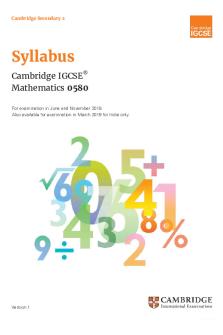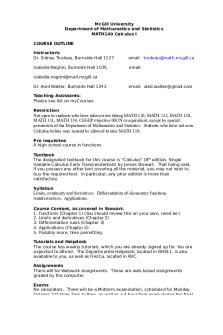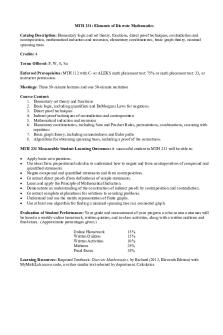1211 Syllabus MATH 128 PDF

| Title | 1211 Syllabus MATH 128 |
|---|---|
| Course | Calculus 2 for the Sciences |
| Institution | University of Waterloo |
| Pages | 13 |
| File Size | 532.1 KB |
| File Type | |
| Total Downloads | 56 |
| Total Views | 149 |
Summary
Course Schedule Syllabus MATH 128 Winter 2021...
Description
Winter 2021
MATH 128 Online
University of Waterloo
Course Schedule IMPORTANT: ALL TIMES EASTERN - Please see the University Policies section of your Syllabus for details
Week Week 1
Lessons Unit 1
Jan 11 Jan 15
Week 2
Assessments and W Introduction (EoL 0)
1. Review of Integration
Review of Integration (EoL 1)
2. Integration by Parts
Integration by Parts (EoL 2)
3. Trigonometric Integrals
Unit 1
Trigonometric Integrals (EoL 3 Trigonometric Substitutions (Eo
Jan 18
4. Trigonometric Substitutions
Integration by Partial Fractions
Jan 22
5. Integration by Partial Fractions
Improper Integrals (EoL 6)
Week 3
6. Improper Integrals
Workshop #1
Unit 1
Jan 25
7. Areas and Volumes
Areas and Volumes (EoL 7)
Jan 29
8. Volumes by Shells
Volumes by Shells (EoL 8)
Week 4
Unit 1
Feb 1 -
Arc Length (EoL 9) Surface Area (EoL 10)
9. Arc Length 10. Surface Area
Introduction to Taylor Polynom
Feb 5 Unit 2
Escape Room #1 (Lec 1 - 8)
11. Introduction to Taylor Polynomials
Week 5
Unit 2
Term Test #1 (Lec 1 - 10)
Processing math: 100%
Sequences (EoL 12) Generated by Centre for Extended Learning
Created 19/01/2021
Winter 2021
Feb 12
MATH 128 Online
12. Sequences 13. Series
University of Waterloo
Series (EoL 13)
14. Integral Test
Integral Test (EoL 14) Reading Week (Saturday, February 13, 2021 to Sunday, February 21
Week 6
Unit 2
Comparison Test (EoL 15)
Feb 22
15. Comparison Test
Alternating Series (EoL 16)
Feb 26
16. Alternating Series, AST, and Remainder
Ratio Test (EoL 17)
Week 7
17. Ratio Test
Workshop #2
Unit 2
Mar 1
18. Power Series and Convergence
Power Series and Convergenc
Mar 5
19. Working With Power Series
Working with Power Series (Eo
Week 8
Unit 2
Taylor Series (EoL 20)
Mar 8
20. Taylor Series
Taylor Polynomials (EoL 21)
Mar 12
21. Taylor Polynomials
Taylor Approximations in Scien
22. Taylor Approximations in Science
Escape Room #2 (Lec 11 -19)
Study Days (Saturday, March 13, 2021 to Tuesday, March 16, 20 Week 9
Term Test #2 (Lec 11 - 22)
Unit 3
Mar 17
23. Differential Equations
Differential Equations (EoL 23)
Mar 19
24. Separation of Variables
Separation of Variables (EoL 2
Week 10
Unit 3
Linear Differential Equations (E Generated by Centre for Extended Learning
Created 19/01/2021
Winter 2021
MATH 128 Online
University of Waterloo
Mar 22
25. Linear Differential Equations
Euler's Method and Direction F
Mar 26
26. Euler's Method and Direction Fields
Linear DE Solution Behaviour
Week 11 Mar 29 Apr 1
27. Linear Differential Equations: Solution Behaviour
Workshop #3
Unit 3
28. Non-Linear Differential Equations: Solution Behaviour Non-Linear DE Solution Behav Parametric Curves (EoL 29)
Unit 4 29. Parametric Curves
Week 12
Unit 4
Polar Coordinates (EoL 30)
Apr 5
30. Polar Coordinates
Arc Length and Area (EoL 31)
Apr 9
31. Arc Length and Area
Vector-Valued Functions (EoL
32. Vector-Valued Functions
Term Test #3 (Lec 23-32)
Week 13 Apr 12 Apr 14
Official Grades and Course Access Official Grades and Academic Standings are available through Quest. Your access to this course will continue for the duration of the current term. You will not have access to this course once the next term begins.
Contact Information Generated by Centre for Extended Learning
Created 19/01/2021
Winter 2021
MATH 128 Online
University of Waterloo
Announcements Your instructor uses the Announcements widget on the Course Home page during the term to communicate new or changing information regarding due dates, instructor absence, etc., as needed. You are expected to read the announcements on a regular basis. To ensure you are viewing the complete list of announcements, you may need to click Show All Announcements.
Contact Us Ask About
Contact Details
Content related questions
Pranabesh Das: [email protected]
Questions about Mobius
Paul McGrath: [email protected]
Absences, Grades, or other administrative questions
Brian Ingalls: [email protected]
Mental Health or personal
Dan Wolczuk: [email protected]
problems Technical Support,
[email protected]
Centre for Extended Learning Technical problems with Waterloo LEARN
Include your full name, WatIAM user ID, student number, and course name and number. Technical support is available during regular business hours, Monday to Friday, 8:30 AM to 4:30 PM (Eastern Time). LEARN Help Student Documentation
Learner Support Services, Centre for Extended Learning General inquiries WatCards (Student ID Cards) Examination information
Student Resources [email protected] +1 519-888-4002 Include your full name, WatIAM user ID, student number, and course name and number.
Discussions Your instructor will be using Piazza to facilitate discussions during this course. If you do not already have Generated by Centre for Extended Learning
Created 19/01/2021
Winter 2021
MATH 128 Online
University of Waterloo
a Piazza account, you will be prompted to create one. Read about Piazza Registration and Data Collection and then visit Piazza to create your account and/or access the course.
Visit Piazza Student Support for information about how to post a Note to a folder or do other tasks in Piazza. If you encounter any difficulties using Piazza, please email your instructor. The main purpose of Piazza is for you to help and have discussions with each other. Although Piazza will be monitored by a TA, we are going to try to let all of you answer each other's questions. We will be mostly just checking for correctness. While it is acceptable for students to discuss the course material and the assignments, you are expected to do the assignments on your own.
Resources for Online Discussions Piazza Support Center Guidelines on Use of Waterloo Computing and Network Resources Online Discussions: Tips for Students
Course Description and Learning Outcomes Description Transforming and evaluating integrals; application to volumes and arc length; improper integrals. Separable and linear first order differential equations and applications. Introduction to sequences. Convergence of series; Taylor polynomials, Taylor's Remainder Theorem, Taylor series and applications. Parametric/vector representation of curves; particle motion and arc length. Polar coordinates in the plane.
Learning Outcomes By the end of this course, students should be able to use integration techniques to solve linear first-order equations and improper integrals, visualize and approximate higher-order differential equations. be able to interpret and derive power series representation of a function, be able to use the concept of linear approximation and apply it to Taylor polynomials as well as use Generated by Centre for Extended Learning
Created 19/01/2021
Winter 2021
MATH 128 Online
techniques for quantifying approximation error,
University of Waterloo
have an understanding of how calculus applies to relations that aren't functions from R to R, and understand the relationship between vector-valued functions, polar coordinates, and applications of integration to arc lengths.
This online course was developed by Paul McGrath, Owen Woody, and Brian Ingalls with support developing assessment materials from Chelsie Romain. Instructional design and multimedia development support was provided by the Centre for Extended Learning. Further media production was provided by Instructional Technologies and Multimedia Services.
About the Course Authors and Instructors Course Author — Owen Zeno Woody Educational Background Biology Ph.D. Candidate (University of Waterloo) B.CS. (Bioinformatics Option, University of Waterloo)
Current Research Gene expression, evolution of gene function, exploratory data analysis, and data mining.
Hobbies/Interests/Sports Board games, video games, floor hockey, learning enough Japanese to follow professional sumo wrestling, and walking.
© University of Waterloo
Course Author and Instructor — Paul McGrath Educational Background Ph.D. in Gravitational Physics (University of Waterloo) M.Sc. in Particle Physics (University of Alberta) B.Sc. in Mathematical Physics (University of Waterloo)
Generated by Centre for Extended Learning
Created 19/01/2021
Winter 2021
MATH 128 Online
University of Waterloo
Current Research Developing a better understanding of what Einstein's theory of gravity (general relativity) can teach us about the nature of the universe we live in and implications for a potential theory of quantum gravity.
© University of Waterloo
Hobbies/Interests/Sports Rock climbing, running, woodworking, gardening, scuba diving, video games, and reading (mostly fantasy).
Course Instructor — Dan Wolczuk Dan Wolczuk has been a lecturer in the Faculty of Mathematics at the University of Waterloo since 2004. He is known for his passion and enthusiasm for teaching, and was named Instructor of the Year for 2012-2013 by the UW Mathematics Society and was awarded the Distinction in Teaching Award by the Faculty of Mathematics in 2013. Dan's research focuses on improving teaching and student learning. For hobbies, Dan enjoys hiking, dancing, and playing various board games.
© University of Waterloo
Course Instructor — Brian Ingalls Brian Ingalls is a Professor in the Department of Applied Mathematics at the University of Waterloo, where he is cross-appointed to the Departments of Biology and Chemical Engineering. His research in synthetic and systems biology is focused on the development of mathematical models to predict the behaviour of intracellular molecular networks and heterogeneous cellular communities. He has been teaching at Waterloo Generated by Centre for Extended Learning
Created 19/01/2021
Winter 2021
MATH 128 Online
University of Waterloo
since 2002. In addition to calculus, he teaches courses in differential equation modelling, systems biology, and synthetic biology design. © University of Waterloo
Course Instructor — Pranabesh Das Pranabesh Das is a mathematician working as a postdoctoral fellow in the Department of Pure Mathematics at the University of Waterloo. Prior to joining Waterloo, he had a postdoctoral position at the University of Pierre and Marie Curie, Paris VI, Jussieu, and The Institute of Mathematical Sciences, India, and completed his Ph.D. at the Indian Statistical Institute. He is interested in number-theoretic problems. Specifically, his interest includes topics like Diophantine
© University of Waterloo
Approximation, Diophantine Equation, and Transcendental Number Theory. His hobbies include soccer, hiking, and international movies.
© University of Waterloo
Materials and Resources Optional Textbook Guichard, D., 2017. Calculus - Early Transcendentals (PDF) by Lyryx Learning. Recommended Practice Problems: Guichard Practice Problems.pdf
Generated by Centre for Extended Learning
Created 19/01/2021
Winter 2021
MATH 128 Online
University of Waterloo
Resources Library services for Co-op students on work term and Extended Learning students MATH 127 Review Materials
Grade Breakdown The following table represents the grade breakdown of this course. (Note: We will not be dropping any end-of-lesson assignments when computing your final grade.) Assessment
Weight (%)
End-of-Lesson Möbius Mini-Assignments
19%
Assignment 0 (Ungraded) Assignment 1-32 (Graded)
Escape Rooms (2 x 3%)
6%
Workshops (3 x 5%)
15%
Term Test 1 (Monday, February 8th)
20%
Term Test 2 (Wednesday, March 17th)
20%
Term Test 3 (Wednesday April 14th)
20%
Note: You must have an average of at least 50% on the three term tests in order to pass this course.
Generated by Centre for Extended Learning
Created 19/01/2021
Winter 2021
MATH 128 Online
University of Waterloo
Course and Department Policies Course Policies Late Submissions No late submissions will be accepted.
Department Policies Calculator Regulation For the final examination, only calculators approved by the Faculty of Mathematics will be permitted. Please refer to the Calculator Regulation to see a list of approved calculators. If you are unable to acquire one of these calculators, you must contact your instructor in the first week or two of the course so an equivalent alternative can be identified and added to the exam proctors' list of permitted aids.
University Policies Submission Times Please be aware that the University of Waterloo is located in the Eastern Time Zone (GMT or UTC-5 during standard time and UTC-4 during daylight saving time) and, as such, the time that your activities and/or assignments are due is based on this zone. If you are outside the Eastern Time Zone and require assistance with converting your time, please try the Ontario, Canada Time Converter.
Accommodation Due to Illness If your instructor has provided specific procedures for you to follow if you miss assignment due dates, term tests, or a final examination, adhere to those instructions. Otherwise:
Missed Assignments/Tests/Quizzes Generated by Centre for Extended Learning
Created 19/01/2021
Winter 2021
MATH 128 Online
University of Waterloo
Contact the instructor as soon as you realize there will be a problem, and preferably within 48 hours, but no more than 72 hours, have a medical practitioner complete a Verification of Illness Form. Email a scanned copy of the Verification of Illness Form to your instructor. In your email to the instructor, provide your name, student ID number, and exactly what course activity you missed. Further information regarding Management of Requests for Accommodation Due to Illness can be found on the Accommodation due to illness page.
Missed Final Examinations Your faculty determines academic accommodation; therefore we advise you to speak with your professor if you anticipate being unable to fulfill academic requirements due to illness or other extenuating circumstances. Further information about Examination Accommodations is available in the Undergraduate Calendar.
Academic Integrity In order to maintain a culture of academic integrity, members of the University of Waterloo community are expected to promote honesty, trust, fairness, respect, and responsibility. If you have not already completed the online tutorial regarding academic integrity you should do so as soon as possible. Undergraduate students should see the Academic Integrity Tutorial and graduate students should see the Graduate Students and Academic Integrity website. Proper citations are part of academic integrity. Citations in CEL course materials usually follow CEL style, which is based on APA style. Your course may follow a different style. If you are uncertain which style to use for an assignment, please confirm with your instructor or TA. For further information on academic integrity, please visit the Office of Academic Integrity.
Turnitin Turnitin.com: Text matching software (Turnitin®) may be used to screen assignments in this course. Turnitin® is used to verify that all materials and sources in assignments are documented. Students’ submissions are stored on a U.S. server, therefore students must be given an alternative (e.g., scaffolded assignment or annotated bibliography), if they are concerned about their privacy and/or security. Students will be given due notice, in the first week of the term and/or at the time assignment details are provided, about arrangements and alternatives for the use of Turnitin® in this course. It is the responsibility of the student to notify the instructor if they, in the first week of term or at the time assignment details are provided, wish to submit the alternate assignment. Turnitin® at Waterloo
Discipline Generated by Centre for Extended Learning
Created 19/01/2021
Winter 2021
MATH 128 Online
University of Waterloo
A student is expected to know what constitutes academic integrity to avoid committing an academic offence, and to take responsibility for his/her actions. A student who is unsure whether an action constitutes an offence, or who needs help in learning how to avoid offences (e.g., plagiarism, cheating) or about “rules” for group work/collaboration, should seek guidance from the course instructor, academic advisor, or the undergraduate Associate Dean. For information on categories of offences and types of penalties, students should refer to Policy 71 - Student Discipline. For typical penalties, check Guidelines for the Assessment of Penalties.
Appeals A decision made or penalty imposed under Policy 70 - Student Petitions and Grievances, (other than a petition) or Policy 71 - Student Discipline, may be appealed if there is a ground. A student who believes he/she has a ground for an appeal should refer to Policy 72 - Student Appeals.
Grievance A student who believes that a decision affecting some aspect of his/her university life has been unfair or unreasonable may have grounds for initiating a grievance. Read Policy 70 - Student Petitions and Grievances, Section 4. When in doubt please be certain to contact the department’s administrative assistant who will provide further assistance.
Final Grades In accordance with Policy 46 - Information Management, Appendix A - Access to and Release of Student Information, the Centre for Extended Learning does not release final examination grades or final course grades to students. Students must go to Quest to see all final grades. Any grades posted in Waterloo LEARN are unofficial.
AccessAbility Services AccessAbility Services, located in Needles Hall, collaborates with all academic departments to arrange appropriate accommodations for students with disabili...
Similar Free PDFs

1211 Syllabus MATH 128
- 13 Pages

Math syllabus
- 40 Pages

Math 171 Syllabus - syll
- 3 Pages

Math Standard Syllabus
- 96 Pages

Syllabus MATH 140
- 2 Pages

Math 111 F21 - Syllabus
- 7 Pages

MATH 165 Syllabus
- 9 Pages

Math gre w2015 syllabus
- 2 Pages

Syllabus Math 221
- 4 Pages

Math 114 Course Syllabus
- 9 Pages

Discrete math syllabus
- 2 Pages

Math+10+Horizontal+Syllabus
- 4 Pages

Syllabus of Math 115
- 4 Pages

Syllabus-math-1324 - Spanish
- 5 Pages

Math 192G Syllabus
- 4 Pages
Popular Institutions
- Tinajero National High School - Annex
- Politeknik Caltex Riau
- Yokohama City University
- SGT University
- University of Al-Qadisiyah
- Divine Word College of Vigan
- Techniek College Rotterdam
- Universidade de Santiago
- Universiti Teknologi MARA Cawangan Johor Kampus Pasir Gudang
- Poltekkes Kemenkes Yogyakarta
- Baguio City National High School
- Colegio san marcos
- preparatoria uno
- Centro de Bachillerato Tecnológico Industrial y de Servicios No. 107
- Dalian Maritime University
- Quang Trung Secondary School
- Colegio Tecnológico en Informática
- Corporación Regional de Educación Superior
- Grupo CEDVA
- Dar Al Uloom University
- Centro de Estudios Preuniversitarios de la Universidad Nacional de Ingeniería
- 上智大学
- Aakash International School, Nuna Majara
- San Felipe Neri Catholic School
- Kang Chiao International School - New Taipei City
- Misamis Occidental National High School
- Institución Educativa Escuela Normal Juan Ladrilleros
- Kolehiyo ng Pantukan
- Batanes State College
- Instituto Continental
- Sekolah Menengah Kejuruan Kesehatan Kaltara (Tarakan)
- Colegio de La Inmaculada Concepcion - Cebu
